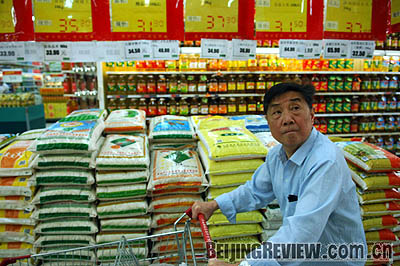|

PAYING MORE: Existing food price hikes, a trigger of inflation, have increased even more due to a surge in the international price of rice. The Chinese must spend more money on daily living necessities and food
Some economists believe that the country's red-hot economic growth could slow down slightly this year. Yu Yongding, Director of World Economics and Politics at the Chinese Academy of Social Sciences, forecasts that China's gross domestic product (GDP) growth rate, which was 11.9 percent last year, will be around 9 percent in 2008.
Liu Fuxiang, an economics professor at the University of International Business and Economics in Beijing, said surging commodity prices might prevent citizens' willingness to buy and consume goods. The fallout from the U.S. subprime mortgage crisis along with the appreciation of the Chinese currency will add more pressure to export companies, even dealing some of them deadly blows. And frequent natural disasters, such as last winter's rough snowstorms in the south and the recent earthquake in Sichuan Province, are pushing consumer prices even higher, Liu told Beijing Review.
While a 2-percentage-point decline may not seem like much, it could affect employment. About 24 million new employees join the country's workforce each year. If the economic growth rate slows down, employment pressure will grow and pose economic and social uncertainties, Liu said.
Worsening inflation
Some economists say inflation could have a more immediate impact on the country's economic growth. In response, the government has promoted a number of policies to bring down consumer prices. Keeping the money supply in check is one of the most important policies. The central bank also has raised the reserve requirement ratio and interest rates frequently. Since 2007, it has raised the reserve requirement ratio 14 times and increased interest rates six times.
But inflation is still haunting the country. Data from the National Bureau of Statistics indicate the consumer price index (CPI) grew 8.2 percent in the first four months of the year. Meanwhile, consumer price increases are spreading from agricultural products to industrial goods. The producer price index (PPI), a barometer for inflation at the wholesale level, stayed at a low level for a long time but soared 7.2 percent in the January-April period. This was 4.1 percentage points higher than the PPI growth rate in 2007.
"Inflation is worsening," Liu said.
Apart from rising agricultural product prices, Liu believes the increasing money supply caused by a huge influx of foreign currencies also is a major driver of inflation.
Before July 2005, China had firmly pegged its currency, the renminbi, at 8.27 yuan to $1. The fixed exchange rate kept the prices of Chinese exports low, greatly stimulating international demand for products made in China. The rising level of exports had pushed the country's trade surplus to record highs. The fixed exchange rate and open economic policy attracted enormous amounts of foreign investment, making China one of the favorite countries for foreign capital.
The country's trade surplus and foreign investment were changed into renminbi through Chinese banks. The central bank had to print more money to buy foreign currencies, because the renminbi cannot be freely converted into other currencies. The increased money flow pushed inflation even higher. Although the country has had a floating exchange rate since mid-2005, the renminbi's slow appreciation against the U.S. dollar has not changed China's high trade surplus and foreign investment level.
Yu Yongding contends in his May 12 research report that inflation has not been the only monster that people are worried about. They are much more concerned about inflation expectations that directly influence the activities of producers and consumers and can lead to price hikes, hoarding and cornering supplies-all of which, in turn, worsen inflation.
Yu said the international economy is facing inflation pressures, and nearly all commodity prices are surging rapidly. The food price hikes have caused panic in some developing countries. The prices of base metals also keep rising significantly. The international environment adds fuel to Chinese inflation, he said.
The American factor
The U.S. economic recession caused by the subprime mortgage crisis would diminish its citizens' demand for Chinese products and drag down Chinese exports, Yu said. Exports are considered one of the three pillars of China's economy. A decrease in exports would have a negative impact on the country's economy.
| 